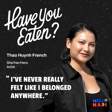Become a Creator today!Start creating today - Share your story with the world!
Start for free
00:00:00
00:00:01

The Power of Self-Awareness With Dave Lu
In this episode, we sit down with Dave Lu-the visionary behind Hyphen Capital and co-founder of Stand With Asian Americans. Dave is a force to be reckoned with combining his entrepreneurial spirit with a deep-rooted passion for social justice. We dive into Dave's journey as a successful tech entrepreneur building companies like Expo. But, it's his unwavering commitment to empowering the Asian diaspora community and family that truly sets him apart.
Transcript
Introduction to 'Have You Eaten?' and Dave Liu
00:00:00
Speaker
Nourishing the Mind, Body, and Soul for the Asian Diaspora. Have you eaten? Hi, everyone. Welcome back to Have You Eaten? where we reclaim our narratives one conversations at a time. And as you know, I like to bring people on that I find really interesting that I think that you would also find interesting too. And today I'm so excited to have Dave Liu with me.
00:00:25
Speaker
Dave accomplished so many things. um So he's the managing director and co-founder of Hyphen Capital. He also is a tech founder and president of Expo. And he's also co-founder of Stand with Asian Americans.
Dave Liu's Journey and Family Expectations
00:00:41
Speaker
So um yeah, the guy is not busy at all. um So welcome, Dave. Thanks je you thanks for having me.
00:00:49
Speaker
Yeah. And the way that we typically start too is we we ask, how do you identify? Yeah. ah He, him, a Taiwanese American, um investor, founder, dad, um all the things.
00:01:03
Speaker
Amazing. Um, and Dave and I actually, um, met not that long ago in person, even though I've known Dave, uh, I may have stalked you a little bit just because you're just so interested. Um, but we met not that long ago and he was just such a delight to meet in person. And so I'm really happy that you're here to have this conversation. The first thing that pops into my mind is, you know, your, your,
00:01:32
Speaker
I think about like the traditional kind of immigrant Asian family and the doctor lawyer, finance, whatever. The thing is like your background is so, um, it's not on the, the usual kind of path of that, right? Like you've kind of you I guess like finance, you know, but at the same time, no. And you, you also, um, do a lot within the community from an activism perspective. So there's so many parts of you. And then I got to, um, I got to experience you as a dad a little bit when you were glowing about your son. And I just thought that was so beautiful. But so just to start, like, how did you get to where you are today?
00:02:19
Speaker
Yeah, I mean, it's funny because I wouldn't have thought that. I i mean, I feel like I've loved to let a pretty predictable and safe career that my parents would have wanted. um But I think I probably went off the rails when I started my first company and that that made them a little more worried. But no, I mean, I was the typical... I was an American kid, grew up in New Jersey, um you know went to Ivy League school, worked in consulting, then did tech jobs at big companies. So I jumped through hoop after hoop um like so many ah Asian Americans to
00:02:52
Speaker
One, I mean, because we were raised, I think that was a safe way to do things. And also two, because um you know that I knew that that's what my parents would have wanted. And it was almost like we were raised to live out there um their dreams to to make sure that we are secure and that we were financially secure and stable. um So I worked at companies like eBay and Apple and Yahoo and all these Sony and other places. And I eventually joined a startup that got bought by Cisco, but the taste of that first startup was really exciting to me because I'd only worked at pretty big companies and before then.
00:03:25
Speaker
That being said, I did work at Yahoo and it was a thousand people. It was a startup, but it was not a tiny startup. But seeing Jerry Yang at the helm sitting around the corner from me leading the company, that was inspiring to me to see that there was an Asian American who could actually do that and build a company that was that well-known at the time. This is the late 90s and Yahoo was one of the biggest internet companies in the world. And so that was inspiring for me to see that.
00:03:50
Speaker
I think after I joined a startup, I realized, oh, this smaller company thing is more for me. I don't like the big company thing. After going to Stanford for business school, I think there was something in me that made me want to do more, something bigger. And I
Entrepreneurial Path and Family Reactions
00:04:03
Speaker
got that bug. And so um you know I joined a startup, got bought, and then I decided to um start my first company, my own first company um after that. And that's when I think I realized, like oh, I really enjoy kind of doing my own thing. And so I built that company, and then I built a second company.
00:04:20
Speaker
I raised venture capital for that and then I think it was that's you know that first taste of doing my own thing was the first time I went off the rails, like off the parent parental rails of what I should do because my dad was an engineer, my mom. Oddly enough, my mom started her own company in freight forwarding because she had worked for someone for 25 years or so like some crazy amount of time and then she decided, you know I want to do this myself because you know i want why am I making money for us someone else? I can do it myself, so my dad supported her in that. and
00:04:51
Speaker
you know She built a little business like right off of Wall Street. by the By the Twin Towers, she had an office. It was um all hers. And so seeing her do that too, is like oh it made me believe but you know it's okay to do this. But once her kid did it, it was not as she wasn't as happy. So I think even after I started my first company, and you know we were throwing off millions of dollars. She was still waiting for me to quit and join Google. And she's like, all right, why don't you get me done with this? But um I think that's just a mentality that you know she had. and um My dad had passed away already when I was 25, so he didn't get to see me start my own company. but um But I think he would have been... like He was all for it. he when When I was little, I told him I wanted to go into business and he said... Because he told me not to be an engineer because he said he'll always be working for someone else. He said, ah you know yeah, business is good because then you'll be the boss. So I think he always hated working for the man or feeling like you know he was always
00:05:46
Speaker
told what to do by people that were less competent than him. But you know i think I think that's why he was you would have been glad that i I did my own thing. And then um I think after that, I realized I had been building a community for Asian founders in the Bay and Silicon Valley. And that's when I started building a syndicate to help out some of these founders during the pandemic. And that's when I started investing and you know getting other people to invest as well. And that kind of led me down the path to to hyphen capital today.
Cultural Upbringing and Parenting Styles
00:06:15
Speaker
um And along the way, all the things that happened, ah you know just writing more and thinking more about the community and how to lift lift everyone up. um It just made that kind of mission and vision more clear to me that that's what I want to do for the rest of my career.
00:06:30
Speaker
That's awesome. So how did you grow up? Like when you were growing up um as a kid, like did your parents, were they lovey-dovey? Like were they telling you they loved you or were they asking you, have you eaten? Oh yeah, no, it was very much a have you eaten. i never got it. I love you. I don't think I got any hugs from them until I hugged them and forced them to hug me. I'm like, I'd always make them really awkward. Cause when I was older, after graduate college, like I was like, hug them and they'd be totally uncomfortable. But I just wanted to get them acclimated to me hugging them or kissing them. and Um, cause I never got that. And I saw, you know, when I go to my non-Asian friends' houses, I'm like, Hey, how come they get all this like affection for their parents? And you know we were not used to it. So I think my sister and I and eventually broke them in, but, um,
00:07:16
Speaker
But yeah, I think, you know, it was very much a, you know, you had a role to play and you were supposed to obey and and and do it. And if you didn't, there'll be consequences. um You know, I think it was very much a, it wasn't like a ah non-loving household, because the way they showed their love was, yeah, how have you eaten? And then, you know, the, the the the how would I say,
00:07:42
Speaker
Uh, corporal punishment was because I did not do well. So I, I got my act together like, and it it worked until I was too big. And I was like, no, it's not going to work anymore. So, but I mean, I think, you know, I was, I was probably not, I was a pretty, uh, troublemaking kid when I was little. but I cannot see that.
00:08:04
Speaker
Oh no, I mean, i so I feel like I set my neighbor's curtains on fire when I was little. And that was like my best friend's like family's house. so I don't know what I was doing, but I remember that and I got in trouble with that. But I got into all sorts of shenanigans.
00:08:18
Speaker
but I liken it to the fact that I was creative and a very, very bunch of kids. So, you know, I wouldn't be starting things and doing things now and causing trouble now if I didn't do it back then. Yeah. Now it's good trouble, but back then it was probably not so good trouble.
Tech Pivot During Pandemic and Personal Growth
00:08:30
Speaker
Yeah. Yeah. And I mean, I can see too that you're, you as a dad, ah you're very different from when you were growing up. Oh yeah. Yeah. The hugging and kissing, probably too much hugging and kissing for my boys, but they're, they're, they're getting it all the time. So.
00:08:44
Speaker
I mean, I know at some point they're not going to want it anymore. And actually my eight-year-old, even when I say bye to him, when I drop him off and I give him a hug and kiss, he's like, ugh, like his wife's face pushed me out. So I'm getting it already. But the five-year-old still is, or four or five-year-old is still in love with him. So we'll see how long that lasts.
00:09:01
Speaker
Yeah. You have to like hold onto that while they, they give it to you and then they'll come back around. They'll come back around though, right? They go through their preteens and their teens and then, and then they come back around. So it's a long time, but yeah, a long time. Wow. Oh my gosh. Um, and then tell us about this tech company that you started. I did not even know about that until I started looking into you a little bit more, yeah but it's really fascinating. It's AI. Um, and it's working with restauranteers.
00:09:30
Speaker
Yeah. So um i've we started the company as a restaurant labor marketplace, which we had, you know, it would almost be like an Uber for cooks at a restaurant with short staffed and the the dishwasher or cook called out sick. We had a whole roster you could, um, we can blast offers too. And they could fill in the shift, but the pandemic flipped that all around when supply was constrained before suddenly nobody needed workers anymore. And it was opposite. So we pivoted to, um, basically looking at all the AI a restaurant chain has and then pulling together all the data from their payroll software to their scheduling software, to their you know POS system, and then layering AI on top of that to tell a restaurant operator what, they like a general manager, what they need to work on and what they can fix. Like, oh, you have scheduling too many hours at 11 AM, m or you're spending too much money on fries or ketchup, or you' you know someone is stealing for you, like this employee is stealing from you, like or ah delivery shifts, this person needs to be retrained because everything's late.
00:10:28
Speaker
But those kinds of things that they don't time to look at all the details about, um we we use AI to tell them and what to do. God, that's fascinating. yeah like That is so interesting. Yeah, especially now. yeah And I love restaurants. i mean i think i've um i dier fast food and i mean I do love Chinese food when I was in high school. And I've always like i've always been into food. And so to to be able to help these restaurants kind of manage their, especially now with margins are pretty thin and with cost rising and labor and ingredients. It's like every penny counts. And so be able to help people is a, is really cool. Yeah. I mean, so i as you're talking about all the stuff that you're doing, um, and especially to like your work with scan with Asian Americans, which is not, not easy, right? I mean, you're probably hearing a lot of stories out there and, um,
00:11:19
Speaker
Like, how do you take care of yourself? like Like, how do you take care of your mental health? Because growing up, you know, also as an immigrant kid, and it sounds like our our um our childhood was very similar with the corporal punishment and all. And we weren't taught to self-care. We weren't taught about mental health and to speak up for ourselves, right?
Masculinity, Vulnerability, and Generational Differences
00:11:44
Speaker
We're just told to do what we're told to do. and um And be successful, right? um So I'm just curious, like how do how do you take care of yourself? Like how do you go about doing that? Yeah, I mean, I would say I am a strong proponent of, you know,
00:12:03
Speaker
getting therapy and ah talking out your emotions and feelings and and getting it all out there. um for For years, I was part of YPO and I had forums. It was very as a group setting where you had other people and you just vulnerably share all of your you know deepest things, but also your peers were going through similar things. so and ah and And you can kind of, together in a community, talk about talk through those issues. What's YPO?
00:12:30
Speaker
Oh, it's a young presence organization. It's kind of like, yeah, all these CEOs and other people get together. But it's a small group, about 10 people that get together every month. um But I mean, I think ah for me, it's a lot of it is now I find um writing has been very good for me because it helps me process a lot. um It helps me kind of think through a lot of the the things that I've kind of like a baggage that are in my head, that I have in my head and um that I grew up with.
00:12:58
Speaker
And I think that writing for other people is kind of cathartic too because then when they read it, they they return the gift with feedback and and you know how they received it. And so I don't know, I think i while i I do feel like I need to probably and spend more time finding a therapist, I've just been so busy.
00:13:18
Speaker
but I think this process of kind of introspection and writing about things that I've dealt with um all these years has been really helpful for me because then like at least I'm processing it. I don't advise against ah for self-therapy because it i don't know that doesn't make sense. But in a way, that has helped a lot. and then you know You find your tribe of people and you you you know find people who get you and and you talk things through them. I'm pretty much an open book about a lot of things, so it's I've always been very vulnerable about these things. but
00:13:51
Speaker
um I think it's harder if you're someone who's kind of introverted and don't like sharing those things because then you kind of suppress it. And there's a lot of, a lot of stuff bottled up, but, um, I'm not one to bottle stuff up. If I'm angry, you're going to hear it. If I am you know upset, you're going to experience it, but I don't think it's healthy to bottle things up. It's still like, um, like makes me, um,
00:14:19
Speaker
Uh, what's the word I'm looking for? and So I have my own kind of, um, not biases, but, um, ideas about Asian men. Right. So I grew up, um, in a single family household with my dad and he was like a former Lieutenant Colonel of the crane army. Like, I mean, he, he checked my bed to make sure it was like fully done. Right. And the white glove tests on my furniture. I mean, it was, it was.
00:14:48
Speaker
hardcore. It was hardcore. And so, um and he definitely did not say I love you. How are you? How's your mental health today? Like, there's nothing like that, right? It was just like, and so I grew up thinking like,
00:15:04
Speaker
Oh, all Asian guys must be like this. Um, and you know, cause my uncles are like that too. And so a lot of my relatives and, and so when you talk about, oh, you know, therapy and you talk about being vulnerable and talking about things, I'm like, whoa. Yeah. I mean, it's different generation. And I think, and, and again, it's not, I don't think all men of any race or, you know,
00:15:32
Speaker
fall into one kind or another, that like there are some that just aren't that way. um I like just even seeing, you know, the Democratic vice president nominee, like Tim Walz, like he's a football coach, but he's also an advisor to the to the gay straight, you know, community that that is high school. And I think it's like being, and you see his girl dad and he loves his daughter and how he's proud of his of her and he's very vocal about it. um I think there's a different view of masculinity that's come about in our generation.
00:16:02
Speaker
You know, there's still plenty of that toxic masculinity out there, but then there's another side that I think people are um hopefully finding and more aware of that you don't have to be that way. I think that yeah the whole insecure alpha male trying to front for, I don't know, for other people. I mean, I don't need that. I think any real man doesn't have to do that because they're insecure enough in their own masculinity. They don't need to front and play a role. Like you see these Andrew Tates and other weird incel dudes out there who I'm like,
00:16:32
Speaker
you realize that that's not attractive to anyone. You're alone for the reason because you're probably a dick. So it's like, yeah you you don't have to be that way. um But I think if you are someone who's introspective, thought think empathetic, think about other people, you usually end up in a place where you should become a feminist because you're like, hey, these are things I would want for myself. Why would I want this for someone else to be able to do these things? Like just because you know I have different, you know,
00:17:00
Speaker
different chromosomes that like I should have it any better than someone else. It doesn't make sense to me. So I think it's, I think it's, that's the way I want to raise my boys too. Cause it's like, you know, I think I didn't have daughters, but I really, really wanted one, a daughter cause one or two, um, one because boys are crazy and they're, they're just kill themselves, try to kill themselves all the time. But, um, I don't know, raising a girl is much, but probably very, very hard too. But,
00:17:27
Speaker
I feel like for me, it's like I would would have loved to have the arbitr opportunity to raise her like I would have raised any other like boy or anyone else because I wanted them to pursue whatever they wanted to be or whatever they wanted to do. um I think that's the most anyone can ask for is that their kid grows up to be able to
Breaking Stereotypes and Generational Trauma
00:17:45
Speaker
be passionate about and good at something they love doing, yeah you know whatever gender it is.
00:17:50
Speaker
um so i mean i think that there is a difference between our you know how our parents were raised, especially when in societies where boys were favored. you know i mean they And were ah thrown in the river or something. I mean, that kind of that kind of is a long, long ways back. But um that that patriarchal society continues you know throughout generations. And it's sometimes hard to get rid of that. But um I'm hoping that that we have we'll have more road models role models that are not like that.
00:18:22
Speaker
um And hopefully that changes what what Asian men specifically are like you know for generations to come. Yeah. i um I have a son who's going to be 17 in November. And a couple of years ago, he actually climbed into bed with me and he's like, I really want to take this online class. And I said, oh, really? Okay, let's let's check it out. And it was an Andrew Tate class.
00:18:52
Speaker
Oh, he was, um, it was kind of like a pyramid scheme. Like kids at school were signing up for it. And then if you get your friends to sign up for it, you get $5, like that sort of thing. <unk> And so we sat there in bed together and I'm like, well, let's talk about this a little bit. And you know, my son is very empathetic. He is such a compassionate little boy. Well, he's not really little anymore. he's tall than me Yeah, he's like almost six feet tall, but um he's just this incredibly kind boy. And so when he brought that up, I was like, what did I do wrong? Oh, man. But what i what occurred to me was um no one did anything wrong or he wasn't, ah you know, his intentions were, I think, a certain ah certain thing. It wasn't necessarily to follow in Andrew Tate's footsteps.
00:19:44
Speaker
But you know i I pride myself in the fact that like I could have these open conversations with him that my parents couldn't have with me. And um and hopefully that kind of helps direct him. yeah And so when you and I are growing up, we didn't have that, right? Like if I went, yeah. And so they're No, not at all. And so, you know, I know for me, there was a moment, this pinnacle moment in time where I had to make a decision of, am I going to continue this trauma? Am I going to continue this, this way? Or am I going to stop it right here and and get help and get therapy and do all that stuff? I'm curious.
00:20:29
Speaker
Did you have that moment? Did you have a moment where you were like, all right, I got to do things differently. And if so, what was that? I mean, I don't know that at a parent as a parent, I've ever thought that because I knew going into it how I would be. But I think that's because for me, I had already changed as a person prior to that just thinking about. um i I don't know. It's like I feel like at a younger age, I'd already been very aware of my feelings and because I was like a peer counselor and other things I found early on my life I was like in eighth grade I was a peer counselor and then I had also been um in different groups like you know along the way and then in college I would I started going to church and then that kind of thing so I feel like I've been around that kind of environment of thinking about others already um but it wasn't something that you know I was never
00:21:22
Speaker
I don't know. There was not a never a switch that turned on for me. It was just more like, that's how you should be. Because like that's how I would want to be. So I felt like I'm like, oh, I should always try to ah think about... And that's a very Asian perspective too of of thinking about others before you think about yourself. Because it's like, oh, like that. you mean But I think in a very real way, if you think about people as humans, not just you know like, oh, I need to do this for them because that's my obligation in a Confucius way. i need to to respect them and care for them as a guest. um But many of the people do it in an overzentful way. It's like, oh, this sucks. I got to do this. But it's ah but for me, it's like, oh, if like if you think about others, then like they they they should. i mean Ideally, they'd be thinking about YouTube, but that's how society a civil society should work, but it doesn't always work. um But I guess I was always kind of the way I was. I never felt like ah I
00:22:17
Speaker
was was one way and then all of a sudden there's like a switch or anything like that. um But what made you become a peer counselor in eighth grade? I mean, that means you were 13. That's a young age to like start, you know, being compassionate and showing up with you like that. I don't know. It went from burning down houses and curtains to that. I don't know. Exactly. Yeah, right. I don't know. I mean, I,
00:22:43
Speaker
Maybe it was because my friend group was very much like that, like that we are always, and and there's, I was very lucky because when I grew up, uh, you know, I grew up in a, when I was up in the fourth grade and I was only Asian kid and a very, it was all black and white school. And then and we we moved to Princeton, New Jersey, and it was much more diverse and I had about 30% Asians. So I had a lot of friends who were also in the same peer counseling group. We all did it together, but also I think it was because A lot of us came from immigrant cultures that were um less about ourselves and feeling entitled than it was about kind of thinking about hearing what others were going through too.
00:23:23
Speaker
um But yeah, I feel like I was very lucky to grow up and where I did and with the people I did because I think they shaped who I was. um ah you know Obviously having a lot of you know um you know female friends helped too because it's like kind of... If we're being dumb boys, they'll they'll call us out on it. and so um And my friends were very frank about that and I'm still friends with them today. um But it's like, I think that help having having healthy relationships with women in your life throughout
00:23:54
Speaker
is is very important. And you know my wife and I worry about it. It's like, oh, you know our oldest only hangs out with boys now all of a sudden. And these boys are boys, and that's how they do it when they're young. But our four and five-year- old like i mean like you know he's twenty five 25 next month, but you know most of his friends are all girls because there aren't any boys in the class right now. But we're wondering, when there are boys, will they change? um Will it be different?
00:24:16
Speaker
um but Right now he can, I mean, he still has his angry moments, but you know, you can tell he's a lot more gentle and sweet because of that. But when they're boys, just super aggro testosterone, whatever. I mean, they don't have it yet, but they're different. Yeah, Rambunctious. Rambunctious, yeah. But yeah, I think I feel like I've always been kind of this way. I've never been that like,
00:24:45
Speaker
I don't like the term alpha because it feels like you have to be some aggressive jerk to be that. And I've never felt like that. I mean, I played sports and I did other stuff and it's fine. um Hell, I've gotten in fights and like you know gotten in a bar fight or kicked I was suspended from school for getting a fight with someone. I'm like, I had no problem with that, but I never felt like I had to be like super masculine or anything like that. It was not, it was not, I just never crossed my mind. I i had to act that way. Um, cause it's just weird to me that you'd have to act the way it you know, and now I'm like, Oh, a real man doesn't have to act. Like it's like, I mean, I think it's, it's kind of this weird sense that all these people who are feeling emasculated and whatnot are all of a sudden having to, like this whole alpha thing is,
00:25:34
Speaker
You know, it's very weird to me because I'm like, well, a real alpha doesn't call himself an alpha. That's just silly. You know, that's totally it seems I don't know what beta means, but it seems very beta to me that you have to even say that you can't be recognized in alpha. You're not probably not the alpha.
00:25:48
Speaker
Right, so right. If you have to tell somebody something that you are, then you probably know that. Yeah, and that's ah it's a whole security thing. And I've always been very, you know, I'm not always been very secure. I'm not kidding. um In am my later, maybe in my 30s and later, I became a lot more secure. And that's when I realized like, Oh, I don't know, I don't have to be someone or someone else or, you know, like, I'm perfectly happy with who I am.
00:26:12
Speaker
Yeah, I mean, do you find that you know being head of um you know hyphen capital and being president of a tech company and co-founder of SWAA and like doing all the work that you're doing in the community, um do you ever Do you ever feel at times, like I know you said you don't feel like you need to be alpha or super masculine, but yeah but i you know I picture in some of the industries that you're in, you have to be, or is that like a totally like false thing that's in my head?
00:26:54
Speaker
I think that's what people assume because we are in a patal patriarchal society that is like, oh, everyone, I have to be a 6'2 white male to be good at anything and like have man any authority.
00:27:07
Speaker
But that's not the case. I mean, there are plenty of very like strong and and confident and but perfectly able women that are running big things too. he yeah they're not They're not alpha. They're alpha-alpha. They don't have to be alpha male or super like, you know, testosterone or whatever. I mean, I think it's just that's what people have been raised to believe is what it looks like to run things. But that's the same reason why people don't think Asians can run things because we're too i quiet or passive or this or that. So until we get that kind of pat the stereotype out of our mind, we're always going to think, oh, it's supposed to be a 6'2 white guy who's
00:27:45
Speaker
know the joke, the 6-2 white guy, blue eyes, whatever. like There's a reason why that's a meme. it's like no People want to date that because that's what we have been programmed to think is successful. But I'm like, why? you know So why can't it be a you know Puerto Rican woman like who's 5'4", thinks she can do it too. But I mean i think that's why you know these these norms, these stereotypes, all these things are really dangerous because it puts everyone in a box,
Societal Divisions and Understanding,
00:28:13
Speaker
right? So for me, it's like, hey, if you're self-aware and confident and you are good at what you do, it doesn't matter what you look like. People respect you because they know that you're you have that confidence, but you also know what you're talking about. All too often, so many people that made it had to fake it the whole way and they've gotten away with it because they look the part. But I mean, too many people have done that and you're like, gosh, this person is so mediocre.
00:28:38
Speaker
like why they even, how they even get here, but they've they've failed forward for so long. I mean, right? right I mean, so it's, um, some people just get to where they are and they just keep failing forward and it's like, great, good for them. But not all of us have that luxury.
00:28:52
Speaker
Yeah, that's why I love having these types of conversations and with people like you where um it challenges not only it challenges beliefs and it does challenge stereotypes. um And I didn't, you know, before I went into this work, I didn't realize how much of that was like burned into my own head, right? And i'm I'm having these conversations with Asian men and it's actually very healing for me personally too, because now I get to see this other side of Asian men that I didn't grow up seeing.
00:29:26
Speaker
um So we our first episode was with Lohai, this musician, and he's a he's ah mental health advocate as well as a musician. And um and then talking to you and and having these types of um insights is...
00:29:46
Speaker
I don't even know what the word for it is, but it it's definitely is very helpful to me personally, and I hope it's helpful to people who are listening. um Because you're right, we have to shatter these stereotypes. um And a lot of the stereotypes live within us.
00:30:03
Speaker
Yeah. And I mean, we propagate them because this is what we grew up with and as we assume, until someone shows you otherwise, you there's a reason for some of these stereotypes and there's a reason why people believe this. And it's unfortunate, but um you know until you hear from people that and meet people, and that's why it's like it's all about meeting people. like We all have stereotypes of all sorts of people, but until you actually meet them, know you you you're projecting a lot of what you've learned.
00:30:31
Speaker
on TV, the media, your parents, whatever it is. yeah But yeah, i mean my hope is that like as we talk to more people and we open our minds and hearts, you're surprised what people can feed you. I mean, I honestly say in this election cycle, and it's like you know I get so angry at the other side and that's what this rage bait and all this stuff makes us do. But on the other than that, I was like, oh, I assume those people hate me because I'm you know i'm Asian or this or that.
00:31:01
Speaker
but, um, or, you know, whatever it might be. But at the end of the day, like, I don't know that they hate me. I just assume they do because that's what I've been made to believe. Right. That's why we're, you know, people talk about civil war because we like all hate each other. We can't get along anymore. It's not this country's too broken.
00:31:18
Speaker
I'm like, man, if that's what they keep telling us, that's what I would believe. But right maybe it's just a bunch of bots that are making me like hate these people and think that they're the traitors and enemies of the state and things like that. Because I know on the flip side, they think the same thing about me and us too. It's like, oh, you're trying to destroy our country. I'm like, oh, no, you're trying to destroy our country. And they're like, oh, you guys are idiots because you follow this stuff. I'm like, oh, that's what you guys are. But they all think the exact same thing. I go over there on the other side and I read their stuff. im like Really? They think this of us, because I'm like, this is exactly what I think of them. So i was like you it's just a lot of it is perceptions and and what we're fed to believe about what the other believes. But whenever you think there's an other, that's the dangerous that's the danger as well.
00:32:02
Speaker
yeah so that's that's actually very, very wise and true. um you know this other this This idea of others um that aren't like you, right? And it's like, that is, yeah, you're absolutely right about that. i've I mean, I've come around to it because I'm like, you know I was always saying, oh man, these boards, they're all white males and they never have any minorities on there or they have a woman on there that might have one you know a black man on there, one Asian on there, but you know why don't they let more people on there? like I was like, oh, these guys must be totally you know they' just racist. They don't like minorities on here. this Then I thought more, I was like, is it that or is it because we don't go to the same schools as their kids and we don't go on the same we volunteer on the same boards as them? We're not in the same golf clubs or whatever with them. so If they don't know, they don't live in the same neighborhoods. like If they don't know anyone of color,
00:32:58
Speaker
I mean, are they intentionally trying to keep people out or is it more? I i would if I knew somebody, but I just don't know anyone. So like keep I just invite my friends or I ask my friends like, hey, sometimes the same for us too. you know It's like if you don't know them, how are you going to even consider them for anything? And so I'm trying to be better about giving people better than the doubt. um I would say I'm pretty quick to judge usually, which is not great. That's like one weakness I have. But you know the more I can believe that there's benefit of the job to be given, I think that can I can change my mind about people too. oh But when does that benefit of the doubt, um when does that get removed, right? like Oh, if enough people show me who they are, then yeah, then it's like, hey, I gave it a shot. Now like I guard myself and you know, this is, it is your your
00:33:48
Speaker
You are who you are, and there's nothing you can do about that. but yeah and i mean I think it's it's optimistic of me to be able to give the better than not, and I'm not always doing it. but Because at some point, you just have to survive and you can't always be used up like that or or hurt like that. but um But yeah, I think I'm trying to teach myself to at least consider the end of the doubt, even for a little bit. um But oftentimes before I'm like, I wouldn't even consider it. I'm like, nope, that person's ah this, that person's that. It's like, but that's the dangerous part is if everyone lives that way, never we're never going to have, you know, kind of nothing's going to be repaired, right?
Stand with Asian Americans and Personal Identity,
00:34:25
Speaker
so Yeah, that's true. That's that's very true. Just switching gears a little bit, tell us a little bit about the work that you're doing with Sound with Asian Americans.
00:34:34
Speaker
yeah Because I mean, it's a pretty you know powerful group of people who have come together in community. yeah And I'd love for you to talk a little bit more about that. Yeah. So it all started during the pandemic when after all the hate crimes were happening in here in San Francisco, where I live in New York, and we're watching the news. When the shootings in Atlanta happened, we wrote a letter that we put in the Wall Street Journal that condemned Asian hate crimes.
00:34:59
Speaker
We had about 8,000 leaders signed it. President Bush signed it. And Andrew Gadalla signed it. J.J. Abrams, the director, signed it. And all these CEOs of Google and DocuSign and DoorDash. And that's what led to this movement. I think that symbol that we had in the Wall Street Journal, a full page ad with the letters enough and big bold letters, and just saying, hey, we write your code, we do your nails, we cook your fruit, and this is how you treat us. we're We're always treated like foreigners in our own country. um That was a symbol for a lot of people to say they could speak up before. I i don't think it was a lot of Asians didn't think they were allowed to speak up because it was like, Oh, why do we have to complain about, you know, we have a pretty good ear. And it's like, no, I mean, if people are treating this way, that's wrong. You know, call it out as such, but that group and that, that movement kind of really gave people kind of ground to stand on for themselves, to stand up for themselves and say, Hey, this isn't right. Like I don't deserve this and to speak up for themselves. And I think for a lot of people, that's the first time they saw anything like that ever happen because most of the agents usually don't publicly
00:35:57
Speaker
make statements like that. But there was a big full page ad in the paper, in the Wall Street Journal of Wallpapers, which is very conservative, wealthy, capitalist you know paper. um But a lot of these people who were reading it were like, this this person lives in my neighborhood, this person's on my board, this person's on like they saw their peers, but they didn't see them that way in that light. um And so since then, you know we've really we've we've gotten kind of we've worked with a lot of nonprofits to help them, but also and We've now kind of pivoted after seeing so many cases that people came to us with about um discrimination in the workplace and not having a voice or not having any legal recourse and not knowing even know what to do in that situation. We've built a legal defense fund and now you know the the the board is you know this the executive director is Korean American woman who's a lawyer who actually won a settlement against her employer for discrimination um for being Asian.
00:36:54
Speaker
And then another victim of this you know Asian discrimination to us also is also on the um the board, another woman. And so for me, I'm proud of where they've become because we talked about how we want to fight against discrimination and in our lives. And a lot of people who messaged me were people who in their workplace said that they were stuck in their jobs and they weren't being promoted because of their race um and all the kind of stereotypes around it. And so it's like, okay, well, if we really make a difference. Like the legal defenseman will actually help us fight. And so no one will bully us anymore. um I think that to me is like, they ah are really proud of that evolution of what has become, because that doesn't exist for us. And so I feel like it didn't exist because we didn't think we deserved to actually fight back. And now, you know, we're realizing, oh, why why shouldn't we fight back?
00:37:46
Speaker
Yeah, yeah. i And then it does it goes back to um speaking up and going against the stereotypes, right? I actually found the organization because I went through my own thing for being Asian and being woman. And um And so I am so supportive of that organization that you've built, um, and and the work that you guys are doing there. Cause when I went through my thing, you didn't exist. And, um, I just remember how alone I felt so alone. And you don't know what to do. You don't even know what the the next thing to it. So that's why we have an ability to actually reach out and someone can talk to you about your assessing your situation because
00:38:32
Speaker
It's very scary when you're you feel alone and you feel like there's no there's no recourse you have, so you just go move on. yeah But that then they don't learn the lesson, they do it with the next person. Yup, exactly. And I was very fortunate that I actually ran into a law firm that um that had a Korean American attorney woman who talked me out of a couple of things and talked sense into me. and Because I was scared. I was you know feeling alone. I was scared. I
00:39:04
Speaker
ah felt like a failure. I felt all these emotions and it really took a village to support me. And so when I found SWAA, I was like, wow, this is so necessary. So thank you so much for all that work that you do that there. No, I appreciate it. I'm glad we have a place for a lot of people in the future that they don't have their own.
00:39:27
Speaker
Yeah, absolutely. um And you know it's time for us to kind of wrap things up a little bit, but I've enjoyed getting to know you so much. um And like I said, like doing this work and talking to people like you and learning more about um Yeah, just differences and the similarities that come up. Because I think you and I are the same generation. We're the same generation. We grew up very similarly, but we had very but we're very different at the same time. And that's like the beautiful thing. you know We're not the same. yeah um But we do have a lot of similarities. And um
00:40:08
Speaker
Yeah, so I just wanted to thank you so much for being here, having this conversation and giving us a little peek behind the doors to Dave Liu. Thank you, Chi. Thanks for having me. That's fun. Yeah. um Well, before we end, I would love to hear any kind of advice you would give to someone, you know, a young person or any person um who's struggling um with their identity or struggling, you know, finding their path. Like, what would you tell them?
00:40:39
Speaker
I mean, honestly, i I think there's so much we grow up with with our parent and the weight of our parents and the burden of our parents' dreams for us. And a lot of times we ah conflate that with our own. And I think you know it takes being self-aware and honest with yourself with what you actually want to do, um because sometimes you actually believe.
00:41:00
Speaker
what they want for you is what you want. And it's hard to separate that. um But then you realize later in life and when not when it's too late, but many years later that it isn't what you wanted for yourself after all. And I hope, you know, I think it takes some search soul searching and, you know, conversations, hard conversations to figure out what do you really want to do with
Conclusion and Pursuit of Happiness
00:41:22
Speaker
your life? Because, you know, you have, if you're young, you have many years ahead of you to figure it out. But um if you don't If you don't feel like you deserve to live your life that with and do what you want to do, then you'll never kind of be fair to yourself um and you'll be unhappy. um I mean, you can tell yourself you're happy because you're secure and you have a good yeah know we could salary, you have a good house and everything else, but um there's a sense of fulfillment that I've seen many people ah at a certain age, they don't have it.
00:41:52
Speaker
And I don't know if they're going to find it because they just don't know what they they never figured out what they wanted. um And so my hope is that when you're younger, that you figure out what you want and what makes you really drives your joy and um fills you up. Because if your cup is always empty, it's going to be it gets hard to to get through um day after day. And mental health wise, that can be draining. I think is you you want to find that because that join you know that that fills your cup is what keeps you, I think, in a good place. And so if you don't find that, I i hope that you do.
00:42:30
Speaker
Oh, thank you. Thank you for that. And um for those of you listening, if no one's told you today, you deserve to be happy. You deserve to live a fulfilled life. And I hope you tune back in to more conversations where I bring interesting people from the Asian diaspora to have these conversations.
00:42:51
Speaker
um And if you have anyone that you want to nominate to be in this conversation with me, I would love to hear from you. It's hey at hello, happy, H-A-P-I dot com. And this is G saying thank you for joining us today. And thank you, Dave, so much again. And until next time, I hope your stomach and your heart stay full. Thank you.
00:43:21
Speaker
Hello, happy fam. Thank you so much for joining us today. Make sure to subscribe, like, and hit the notification bell. And until next time, I hope your bellies and your hearts stay full.









